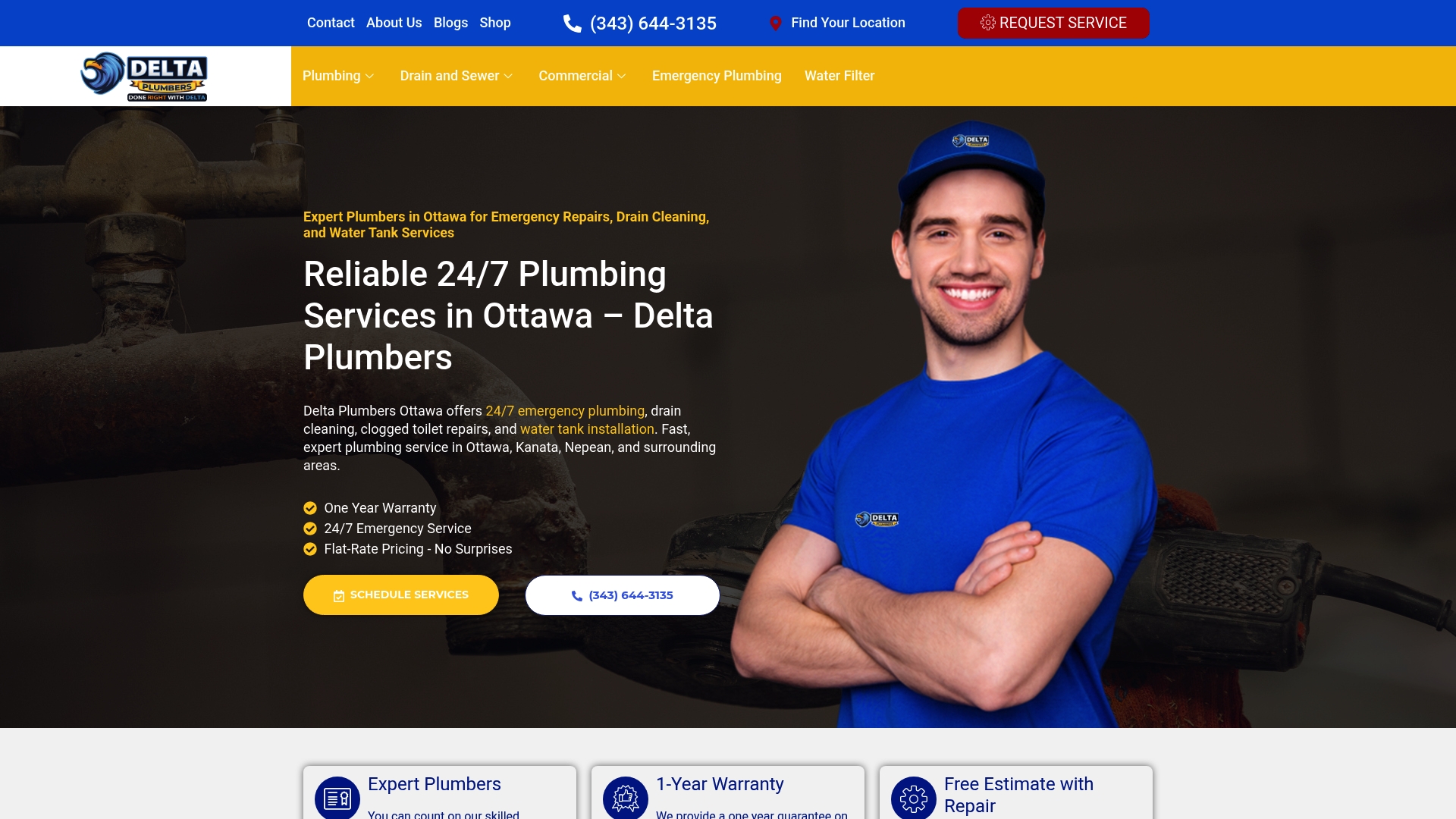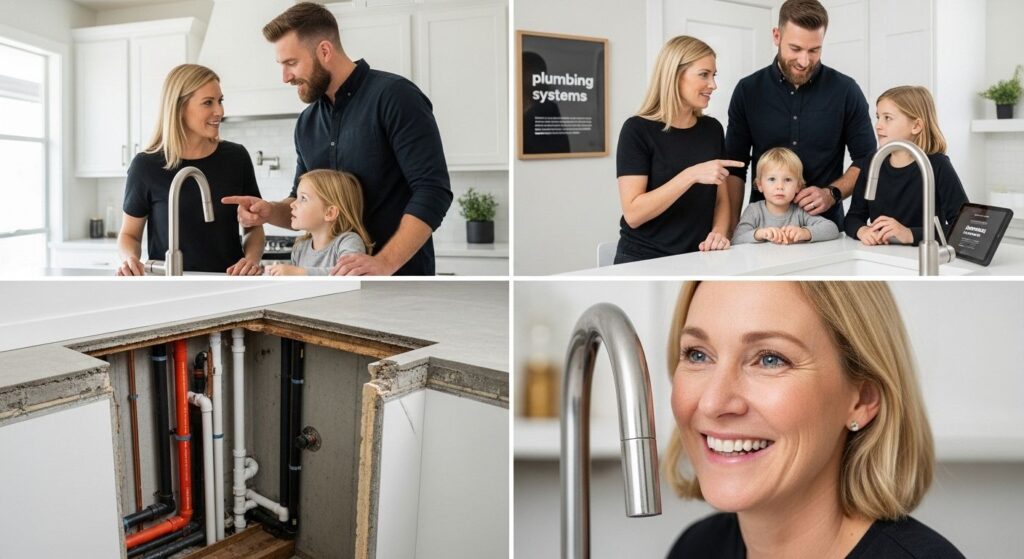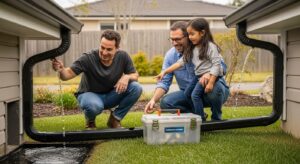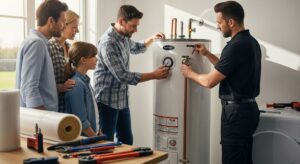Ottawa homes rely on plumbing systems that do much more than just deliver water and take away waste. Plumbing reliability often flies under the radar, yet regular inspections can prevent up to 70 percent of plumbing failures. Most people think picking any standard system will work fine, but that choice can impact everything from property damage risk to water conservation and long-term costs. The smartest solution might just be rethinking how you choose and maintain your pipes altogether.
Table of Contents
- Key Types of Plumbing Systems Explained
- Choosing the Right Plumbing System for Your Property
- Maintenance Tips for Ottawa’s Plumbing Systems
Quick Summary
| Takeaway | Explanation |
|---|---|
| Understand DWV Systems | Drain-Waste-Vent systems are critical for removing wastewater and preventing sewer gas entry. Proper design ensures effective waste transport and ventilation. |
| Choose Pipe-in-Pipe Systems | This system offers leak protection and easy repairs, minimizing water damage. It’s ideal for maintaining building integrity over time. |
| Implement Dual Piping for Efficiency | Dual piping separates potable and non-potable water, promoting sustainable usage and reducing strain on resources, especially in water-scarce regions. |
| Prioritize Seasonal Maintenance | Regular seasonal inspections can prevent serious plumbing issues. Focus on insulation and thorough checks for winter preparedness and damage assessment. |
| Leverage Technology for Maintenance | Smart technologies like leak detectors and smart meters help monitor plumbing systems proactively, preventing potential issues before they escalate. |
Key Types of Plumbing Systems Explained
Understanding the various types of plumbing systems is crucial for homeowners and property managers in Ottawa. These complex networks of pipes, fixtures, and connections play a vital role in delivering clean water and managing wastewater efficiently.
Drain-Waste-Vent (DWV) Systems
The drain-waste-vent system represents a fundamental infrastructure in residential and commercial buildings. Learn more about our plumbing system solutions. According to Wikipedia, this system serves three critical functions: removing wastewater, managing sewage, and preventing dangerous sewer gases from entering living spaces. The DWV system utilizes strategically placed water-filled traps that create a seal, blocking toxic gases from penetrating indoor environments. These traps are typically found under sinks, toilets, and other plumbing fixtures, ensuring a safe and hygienic living space.
The design of a DWV system involves interconnected pipes that work seamlessly to transport waste and greywater away from the building. Vertical vent pipes extend through the roof, allowing air to circulate and prevent vacuum formation within the pipes. This ventilation is essential for maintaining proper drainage and preventing potential backups or slow-moving waste streams.
Pipe-in-Pipe Plumbing Systems
Modern plumbing technologies have introduced innovative solutions like the pipe-in-pipe system. Research from Wikipedia reveals that this advanced configuration involves running water pipes inside a protective outer pipe. This design offers multiple advantages for property owners. The outer pipe acts as a protective barrier, containing any potential leaks and preventing water damage to building structures. If an inner pipe develops a leak, it can be detected and replaced without extensive wall demolition, significantly reducing repair costs and minimizing disruption.
Pipe-in-pipe systems are particularly beneficial in commercial and residential settings where maintaining infrastructure integrity is paramount. The added layer of protection ensures longevity and reduces the risk of unexpected water damage, making it an increasingly popular choice among Ottawa property managers and homeowners seeking reliable plumbing solutions.

Dual Piping Water Systems
Dual piping represents a sophisticated approach to water management, especially in regions prioritizing water conservation and efficiency. According to Wikipedia, this system involves two separate water supply networks: one for potable (drinking) water and another for reclaimed or non-potable water. In practical applications, the reclaimed water network can be used for irrigation, toilet flushing, and other non-consumption purposes.
This innovative system significantly reduces the strain on municipal water resources by repurposing water that would otherwise be discarded. For Ottawa residents and businesses looking to implement sustainable practices, dual piping offers an environmentally conscious solution that minimizes water waste while maintaining high standards of water quality and safety.
Understanding these plumbing systems empowers property owners to make informed decisions about their infrastructure, ensuring efficient water management, reducing potential risks, and contributing to sustainable urban development.
To help you compare the three main types of plumbing systems discussed, here is a table summarizing their key features and benefits for Ottawa homeowners and property managers.
| Plumbing System | Primary Function | Key Advantages | Typical Applications |
|---|---|---|---|
| Drain-Waste-Vent (DWV) | Removes wastewater and manages sewer gases | Prevents toxic gas entry; essential for hygiene | All residential and commercial buildings |
| Pipe-in-Pipe | Distributes water through an inner pipe inside a sheath | Leak protection; easy repairs; minimizes damage | Modern homes & high-integrity properties |
| Dual Piping | Supplies both potable & non-potable water separately | Water conservation; sustainable usage | Properties focusing on resource efficiency |
Choosing the Right Plumbing System for Your Property
Selecting the appropriate plumbing system for your Ottawa property requires careful consideration of multiple factors that impact long-term performance, efficiency, and cost-effectiveness. The right choice can significantly influence your property’s water management, energy consumption, and overall infrastructure reliability.
Material Selection and Performance Considerations
Choosing plumbing materials is a critical decision that affects system durability and functionality. Learn about our professional plumbing upgrades to understand the nuances of material selection. According to the Plastic Pipe and Fittings Association, property owners must evaluate several key factors when selecting plumbing pipes:
- Durability: Different materials offer varying levels of resistance to corrosion, temperature fluctuations, and mechanical stress.
- Local Building Codes: Ensure selected materials comply with Ottawa’s specific municipal regulations.
- Budget Constraints: Balance initial installation costs with long-term maintenance expenses.
- Environmental Impact: Consider sustainable options that minimize resource consumption.
Traditional materials like copper have long been favored for their reliability, while modern alternatives such as PEX and CPVC offer increased flexibility and cost-effectiveness. The American Society of Plumbing Engineers highlights that each material presents unique advantages depending on specific property requirements.
The following table outlines different types of plumbing materials mentioned in the article, along with their key qualities and considerations for Ottawa properties.
| Material | Durability | Cost-Effectiveness | Flexibility | Common Uses |
|---|---|---|---|---|
| Copper | High | Moderate/High | Low | Water supply |
| PEX | High | High | High | Water supply |
| CPVC | Medium/High | High | Medium | Water supply |

Efficiency and Water Distribution Systems
Modern plumbing systems prioritize water and energy efficiency through innovative distribution approaches. The Building America Solution Center recommends evaluating core and manifold plumbing configurations to optimize hot water delivery and reduce wastage.
Manifold systems, characterized by direct pipe connections to individual fixtures, offer several advantages:
- Reduced water volume in pipes
- Faster hot water delivery
- Minimized heat loss during transmission
- Easier maintenance and potential repair
Property owners in Ottawa should consider their specific usage patterns, building layout, and energy conservation goals when selecting a water distribution system. Factors like pipe length, insulation quality, and fixture proximity play crucial roles in determining overall system efficiency.
Climate and Regional Considerations
Ottawa’s unique climate presents specific challenges for plumbing infrastructure. Extreme temperature variations require systems designed to withstand freezing conditions and rapid temperature shifts. Insulation, pipe placement, and material selection become paramount in preventing potential freeze-related damage.
Additionally, consider factors such as:
- Soil composition and potential ground movement
- Water quality and potential mineral deposits
- Local water pressure variations
- Future expansion or renovation plans
Consulting with professional plumbers who understand Ottawa’s specific environmental conditions can help you make an informed decision that balances performance, durability, and cost-effectiveness.
Ultimately, choosing the right plumbing system is an investment in your property’s long-term functionality and efficiency. Careful evaluation of materials, distribution methods, and regional requirements will ensure a robust and reliable plumbing infrastructure that meets your specific needs.
Maintenance Tips for Ottawa’s Plumbing Systems
Maintaining plumbing systems in Ottawa requires strategic planning and proactive approaches due to the region’s unique climate and environmental challenges. Explore our comprehensive maintenance guide to ensure your property’s plumbing infrastructure remains robust and efficient.
Seasonal Preparation and Inspection
Ottawa’s extreme temperature fluctuations demand comprehensive seasonal maintenance strategies. According to the Canadian Home Builders’ Association, property owners should conduct thorough inspections at least twice annually to prevent potential infrastructure failures.
Key seasonal maintenance activities include:
- Winter Preparation: Insulate exposed pipes to prevent freezing
- Spring Assessment: Check for winter-related damage and potential leaks
- Summer Evaluation: Inspect outdoor plumbing connections and drainage systems
- Autumn Readiness: Clear drainage systems and prepare for incoming cold temperatures
Specifically during winter months, protecting pipes from freezing becomes critical. Implementing proper insulation techniques, maintaining consistent indoor temperatures, and allowing minimal water flow during extreme cold can significantly reduce the risk of pipe ruptures.
Here is a checklist table of essential seasonal plumbing maintenance activities recommended for Ottawa property owners, based on the article’s suggested schedule.
| Season | Maintenance Activity | Status (Yes/No/To Do) |
|---|---|---|
| Winter | Insulate exposed pipes | |
| Spring | Check for winter-related damage & potential leaks | |
| Summer | Inspect outdoor plumbing & drainage | |
| Autumn | Clear drainage systems & prep for cold temperatures |
Preventative Maintenance Techniques
Preventative maintenance represents the most cost-effective approach to plumbing system management. Research from the National Research Council of Canada indicates that regular inspections can prevent up to 70% of potential plumbing failures.
Essential preventative strategies include:
- Regular drain cleaning to prevent blockages
- Checking water pressure and potential mineral buildup
- Inspecting seals and connections for potential leaks
- Monitoring water heater performance and sediment accumulation
- Testing sump pump functionality
Utilizing advanced diagnostic tools like moisture sensors and thermal imaging can help identify potential issues before they escalate into significant problems. Professional plumbers can provide comprehensive assessments that go beyond surface-level inspections.
The table below summarizes key preventative plumbing maintenance techniques highlighted in the article, designed to help Ottawa property owners reduce the risk of plumbing failures.
| Technique | Purpose |
|---|---|
| Regular drain cleaning | Prevent blockages and clogs |
| Checking water pressure & mineral buildup | Maintain flow, prevent damages |
| Inspecting seals and connections | Detect and prevent leaks |
| Monitoring water heater performance | Ensure efficiency, prevent sediment buildup |
| Testing sump pump functionality | Prevent basement flooding |
Technology and Professional Support
Modern plumbing maintenance increasingly relies on technological interventions and professional expertise. Smart home technologies now offer real-time monitoring of water systems, detecting anomalies and potential issues before they become critical.
Ottawa homeowners should consider:
- Installing water leak detection systems
- Using smart water meters
- Implementing automatic shut-off mechanisms
- Scheduling annual professional inspections
Professional plumbers bring specialized knowledge about local infrastructure challenges, understanding the specific demands imposed by Ottawa’s climate and municipal water systems. Their expertise can help develop tailored maintenance strategies that address individual property needs.
Ultimately, effective plumbing maintenance is about balancing proactive strategies, technological solutions, and professional insights. By investing time and resources into systematic care, Ottawa property owners can protect their plumbing infrastructure, prevent costly repairs, and ensure long-term system reliability.
Frequently Asked Questions
What is a Drain-Waste-Vent (DWV) system?
A Drain-Waste-Vent (DWV) system is a plumbing infrastructure that removes wastewater, manages sewage, and prevents sewer gases from entering living spaces through specially designed traps and vent pipes.
How does a pipe-in-pipe plumbing system work?
A pipe-in-pipe plumbing system consists of an inner pipe that distributes water and an outer protective pipe that contains leaks, helping to prevent water damage to building structures. If a leak occurs, it can be repaired with minimal disruption.
What are the benefits of using dual piping water systems?
Dual piping water systems separate potable (drinking) water from non-potable water, promoting water conservation by allowing reclaimed water to be used for purposes like irrigation and toilet flushing. This reduces the strain on municipal water resources.
What maintenance tips can I follow to keep my plumbing system in optimal condition?
Regular maintenance tips for plumbing systems include seasonal inspections, insulating exposed pipes, checking for leaks, cleaning drains, and monitoring water heater performance. These practices can prevent up to 70% of plumbing failures according to research.
Ready for Plumbing Peace of Mind in Ottawa?
Choosing the right plumbing system is more than just a technical decision. It’s about keeping your Ottawa home or business safe from unexpected leaks, frozen pipes and costly water damage. When drain-waste-vent systems, pipe-in-pipe setups or dual piping are not planned and maintained with care, you are at risk for major disruptions and expensive repairs. The article you just read highlights how small oversights or skipped inspections can leave you scrambling at the worst time. If you want lasting reliability through every season, partnering with proven local experts is crucial.

Let Ottawa’s trusted professionals help you select, install and maintain the best system for your property. Choose Delta Plumbers Ottawa for emergency support and ongoing care from experienced plumbers. Explore more about local plumbing options for both homes and businesses in the Uncategorized Archives – Delta Plumbers | Ottawa or contact us now through our main site for same-day service and year-round protection. Get proactive before minor issues turn into costly headaches.









